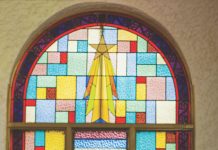When people see the homeless standing on a street corner with a sign that asks for help, many feel at a loss. They could give them money or a sandwich, but some often wonder how often that is simply a handout and not a hand up to help themselves into a better life.
When people see the homeless standing on a street corner with a sign that asks for help, many feel at a loss. They could give them money or a sandwich, but some often wonder how often that is simply a handout and not a hand up to help themselves into a better life.
Interfaith Shelter Network, a 501(c)(3) non-profit corporation is one great solution. Its goal to help end homelessness in San Diego through a consortium of nearly 120 churches and faith-based organizations reaches into people’s lives, meeting their physical and spiritual needs. Homeless shelters held at the churches are staffed by church members or other volunteers on a rotational basis.
Approximately half of the congregations are host churches and the other half are support churches. Support churches are usually small churches that are not able to host a shelter, so they help and assist the others.
“Interfaith Shelter has a unique way of serving our homeless population,” said Bill Zucconi, rotational shelter coordinator. “Since our shelters are staffed by volunteers, we serve the situationally homeless, not the chronic homeless.”
With the shelters holding no more than 12 people, the clients, as they are referred to, have a family-type environment. Meals are homemade and volunteers get to know the guests on a one-to-one basis.
Currently, there are 11 host churches in the East County. But the ISN is seeking more churches, especially in the Lakeside area, said Zucconi.
“Our largest need is more churches, especially this year because of the anticipated extreme winter weather predicted. Currently we are a winter only shelter program. Since homelessness does not go away in the spring, summer and fall, we want to operate year around,” Zucconi said.
As ISN is a non-profit, donations of money are always welcome. “However, funding is secondary and caring for the homeless is our primary focus. Our costs are kept to a minimum because most of our activities like meals, shelter space and labor are provided by volunteers,” he said.
Truth is, if it were not for Interfaith Shelter Network and the other shelters in the area, ISN’s clients would either be living on the streets, or in their cars, if they have one, or short-term trying to stay with friends. This is referred to as couch surfing, or moving from one friend’s house to another until they wear out their welcome, Zucconi explained.
Throughout San Diego County, Interfaith Shelter Network is organized into seven regions, with each region beginning at a different time, depending on how many churches are in that region and what dates the churches are available. East County will start this year just after Thanksgiving and run to the end of April.
Clients come to ISN through contracted case management agencies. These agencies screen and vet potential clients.
“Since are shelters are staffed by volunteers, we serve the situationally homeless, not the chronic homeless,” Zucconi said.
“Most of our guests [….] do better in a smaller, less institutional environment. Also, our host churches make available to our guests all the spiritual services that their churches offer, if the guests want,” he said.
Additionally many of the churches can meet the individual needs of the guests, such as specific items of clothing, suitcases, and helping with minor car repair or any other individual needs.
“In the past we have had some guests come back and join a particular church after they have gotten back on their feet and volunteered and helped out with the shelter program,” Zucconi said.
ISN is a program that empowers the situationally homeless, offering workshops on budgeting and career planning taught by professionals in their field.
The shelters are for nighttime only, opening their doors about 5 p.m. All guests must leave by around 7:30 a.m. The churches provide a hot dinner, breakfast in the morning and items to take for lunch, as well as showers and laundry services. During the day, the clients are under the direction of their case managers who have developed an individual case plan for them. This includes things such as seeking employment, education or job training, applying for benefits if the quality for them. Each church host for two weeks and then the guests move on to the next scheduled church.
“It is hard to determine how many homeless people there are in San Diego even though a homeless census is taken every year,” Zucconi said.
“So many people are living on the edge. They miss one or two paychecks and they are out on the street. We are also seeing some young people who are coming out of the foster care system. Some people have health issues and need to receive disability, social security or other benefits.
East County churches have a perfect opportunity to help Interfaith Shelter Network in offering the homeless a place to get on their feet. A training session will be held for coordinators and other volunteers at the Chinese Community Church at 4998 Via Valarta in San Diego on Sept. 19. For more information, go to www.interfaithshelter.org.













